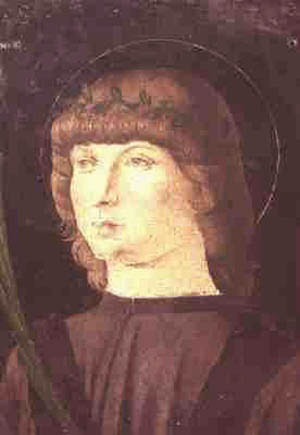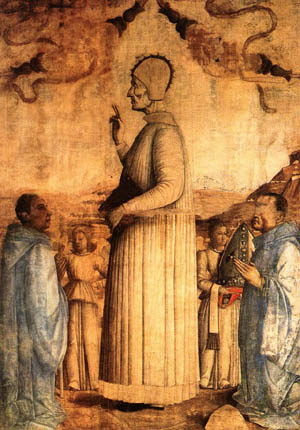The following concerning this saint is by
Prof. Plinio Corrêa de Oliveira
At age 19 he had a vision of Eternal Wisdom inviting him to unite himself with it. He entered the religious life in the Augustinian Order of the Canons of St. George on Alga Island, one mile from Venice. He was noted for his great austerities and humiliations. He used to go beg alms for the community, and often received sarcastic barbs instead of goods, for which he thanked God. Soon after his ordination he was elected General of his Order. He reformed it so profoundly that he is considered its second founder. In 1433 he was named Bishop of Venice. He tried to refuse the dignity, but Pope Eugene IV obliged him to accept it. He brought peace to numerous state quarrels, founded 15 new monasteries and added many new parishes in which he took a special care of the accuracy and beauty of the divine worship. In 1450 he was elected Patriarch of Venice. The ecclesiastic reform he made in Venice is justly considered a precursor to what St. Charles Borromeo did in Milan after the Council of Trent. His books and sermons transmit a great devotion to the Passion of Our Lord. On January 8, 1455 he died. He was beatified in 1524 by Clement VII and canonized in 1690 by Alexander VIII. His feast day was established for September 5, the day of his episcopal consecration. Comments of Prof. Plinio: First, it is interesting to see that since his childhood St. Laurence Justinian was marked by a profound seriousness and that his piety produced admiration and respect. Anyone who saw him was impressed by his seriousness. This is the way it should be. According to the sentimental piety that infiltrated the Church in the 18th and 19th centuries, the saints should all be amiable, tender, and soft. St. Laurence was the opposite of such a model since his childhood. This is excellent! I don’t deny that piety at times can cause tenderness, but to hold it up as the principal note of sanctity seems absurd to me. According to the selection, his piety produced admiration and respect. These are the true characteristics of sanctity, as God always causes respect and admiration, and the saint is a man who lives with God.
Second, while he was very young, he entered an Order that was corrupted, putrid. He was elected its superior and reformed it to the point that he is considered its second founder. That is, it was an Order so rotten that it needed a general reform, and was reborn at the hands of a saint. But it was not so rotten that it would not elect a saint to reform it. Today, what Order elects a saint to reform it? Third, in 1433, about 100 years before the explosion of Protestantism, the Church was already immersed in the great crisis of the Revolution. The humanist mentality was promoting pride and sensuality everywhere, and preparing the way for the acceptance of the bad ideas of Protestantism. Well, St. Laurence Justinian reformed his Order, and instead of being persecuted and despised, he was named Patriarch of Venice. Once again, you can see a difference between that phase of the Revolution and the point it has reached in our days. In those times, there was a St. Laurence Justinian as Patriarch of Venice and a St. Charles Borromeo as Archbishop of Milan; today instead there was a Angelo Rocalli in Venice and a John Baptist Montini in Milan. The first two Saints lived their lives in preparation for, or as a consequence of, the Council of Trent. That is to say, they dedicated themselves to help the Church to resist Protestantism. The two progressivist Cardinals (who became Popes) prepared the Church for Vatican Council II, which opened her doors not only to Protestantism but also to all the heresies synthesized in Modernism. At the time of St. Laurence, many people were already revolutionary but they were at least aware of the corruption and chose saints to reform them. In our times, people have lost the notion of good and evil and can actually think that those progressivist Cardinals were good. There is an enormous moral difference between these two steps of the Revolution. Let us pray to St. Laurence Justinian asking him to give us his seriousness in order to face the Revolution within the Church and to help us to restore her, as he did in his Order and in the Archdiocese of Venice. |


No comments:
Post a Comment